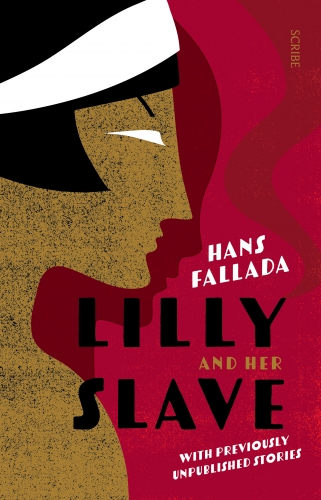28/01/2023
Lilly and Her Slave
We totally missed to relay that info: the publication of Lilly and Her Slave in 2022, at Scribe Publications, in London (translated by Alexandra Roesch).
That book contains several unpublished stories discovered recently in 2020 (see below the Editorial Note).
These stories are:
Robinson in Prison
The Machinery of Love
Lilly and Her Slave
The Great Love
Pogg, the Coward
Who Can Be the Judge?
These is an important complement to already published stories from Hans Fallada, making the bibliography almost complete, for our delightment!
The Editorial Note brings enough details so that it is important to mention here:
EDITORIAL NOTE
By Johanna Preuβ-Wössner and Peter Walther
The stories published in this volume are based on the manuscripts found in the evaluation reports of forensic psychiatrist Ernst Ziemke in the case of Rudolf Ditzen, who we know as Hans Fallada. The file was discovered by Johanna Preuβ-Wössner in the State Archive in Schleswig, and was analysed by her and Jan Armbruster for the first time in the article ‘The forensic-psychiatric evaluation of the writer Hans Fallada by the forensic pathologist Ernst Ziemke in 1926’ [1] (in Archives of Criminology, 245 [2020], pp. 118-33).
In addition to Ziemke’s expert report, the file also contained a handwritten and typewritten version of a letter from Fallada to Ziemke; transcripts of letters from Fallada to his parents and his aunt Adelaide Ditzen; a note from the Berlin police headquarters; and copies of the preliminary psychiatric report as well as the literary works printed here.
Upon being imprisoned in Kiel, Fallada wrote his stories in ink on lined writing paper. He folded (at least five) large-format sheets of paper in half, and combined these to form a bundle of papers. Lilly and Her Slave consists of 18 handwritten pages, taking up one of the bundles thus created. Robinson in Prison (pp. 1–3), Pogg, the Coward (pp. 3–10), and The Great Love (pp. 10–46) are written in succession, filling another bundle. The Machinery of Love comprises 65 separate pages, again taking up one bundle.
The texts Lilly and Her Slave and Robinson in Prison are published here for the first time. The stories The Machinery of Love and The Great Love are adapted from manuscripts preserved in the archive of the Academy of Arts in Berlin and published in a different text form: Hans Fallada, Frühe Prosa in zwei Bändern, Band 2, edited by Günter Caspar (Aufbau Verlag, Berlin, 1993, pp. 113–74 and pp. 175–280). Pogg, the Coward was adapted (also in different text form) from a manuscript preserved in the Hans Fallada Archive in Carwitz: Hans Fallada, Junge Liebe zwischen Trümmern, ed., with a postscript by Peter Walther (Aufbau Verlag, Berlin 2018).
In the case of the manuscripts of the short stories The Machinery of Love and Pogg, the Coward, found among Ziemke’s evaluation reports, these are revisions of the previously known text versions. Fallada made changes to the text throughout, mainly to improve the precision of expression and the rhythm of the sentences, including changes in punctuation, as well as corrections of errors or mistakes and the deletion of redundant narrative elements.
An additional, different ending exists to the early version of The Machinery of Love, which Fallada either wrote before the improved version printed here or, more likely, at a time when he no longer had a copy of the earlier story to hand.
Robinson in Prison and Lilly and Her Slave only exist in the text form found in the Ziemke file. The latter manuscript shows formal similarities with the manuscripts of the early text versions of The Machinery of Love, The Great Love, and Pogg, the Coward, which is evident in the similarities in handwriting, paper, page layout, pagination, and even in the characteristic fold of the manuscripts. Part of the same group of manuscripts is the previously unpublished Fallada manuscript Who Can Be the Judge?, which, however, was not found in the court file. It is included here because of its proximity in terms of content and time of creation.
The biographical references in Pogg, the Coward to the experiences Fallada had recently had himself indicate that the author wrote this story during his imprisonment in Kiel. Therefore, the revision printed here must also have been written on the same continuous bundle of papers as Robinson in Prison and The Great Love, this then also applies to the revision of these stories. Whether the formal similarities found in Lilly and Her Slave and in the manuscripts of the earlier text versions of Pogg, the Coward and The Great Love also mean that all of these texts were written in custody in Kiel remains unclear.
[1] Original title: Die forensisch-psychiatrische Begutachtung des Schriftstellers Hans Fallada durch den Gerichtsmediziner Ernst Ziemke im Jahr 1926 [Ed Note].
15:01 | Lien permanent | Commentaires (0)





Les commentaires sont fermés.